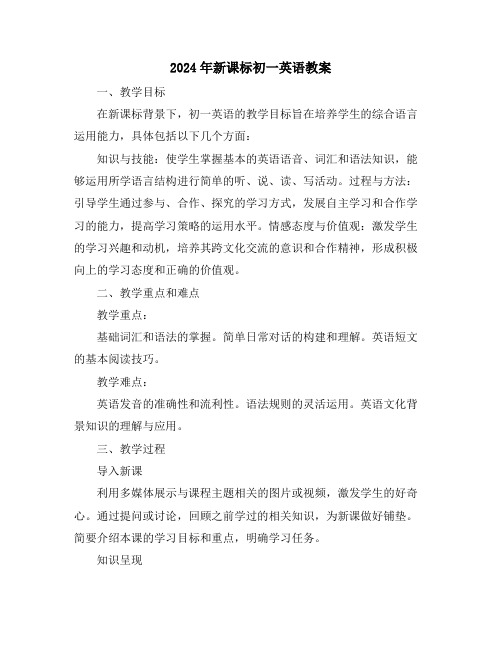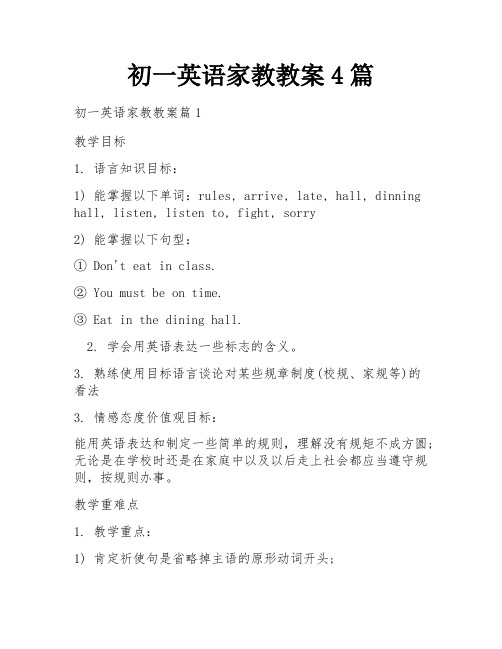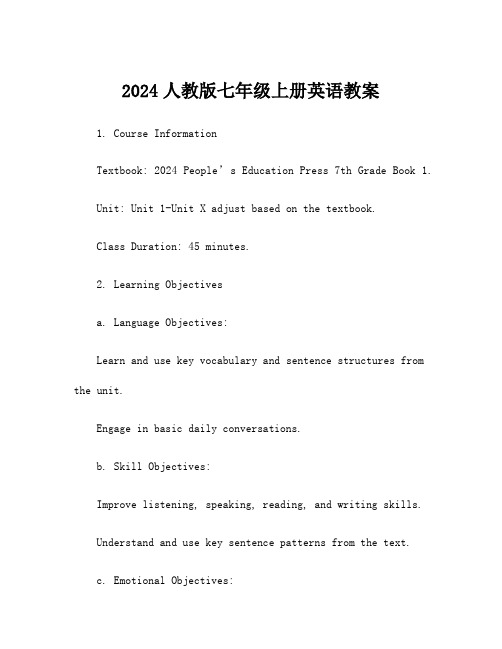初一英语教案
初一上册英语教案

初一上册英语教案(经典版)编制人:__________________审核人:__________________审批人:__________________编制单位:__________________编制时间:____年____月____日序言下载提示:该文档是本店铺精心编制而成的,希望大家下载后,能够帮助大家解决实际问题。
文档下载后可定制修改,请根据实际需要进行调整和使用,谢谢!并且,本店铺为大家提供各种类型的经典范文,如工作总结、工作计划、演讲致辞、规章制度、合同协议、条据文书、励志名言、好词好句、教学资料、其他范文等等,想了解不同范文格式和写法,敬请关注!Download tips: This document is carefully compiled by this editor. I hope that after you download it, it can help you solve practical problems. The document can be customized and modified after downloading, please adjust and use it according to actual needs, thank you!Moreover, our store provides various types of classic sample essays, such as work summaries, work plans, speeches, rules and regulations, contract agreements, policy documents, inspirational quotes, good words and sentences, teaching materials, other sample essays, and more. If you want to learn about different sample formats and writing methods, please stay tuned!初一上册英语教案初一上册英语教案【5篇】教案为教师提供了指导和支持,明确了教学的目标和方法。
初一英语教案模板范文5篇

初一英语教案模板范文5篇初一英语教案模板范文5篇写教案不能千篇一律,要发挥每一个老师的聪明才智和创造力,老师的教案要结合本地区的特点,因材施教。
老师要根据学生特性进行教学研究、教学交流和教学探讨。
以下是带来的初一英语教案模板范文内容,感谢您的阅读,希望能帮助到您!初一英语教案模板范文1一、Teaching Demands and Aims(教学目标)二、Teaching important and difficult point (教学重点)1、words2、sentences3、grammars三、Teaching Aids (教具)四、Teaching procedures(教学过程) Greeting(问候) warm up(热身) Review(复习) NewLeon(新课) Step One: Step Two: Step Three: Follow up(叮咛)五、Homework(作业布置)作业的布置一、书面作业1、每节课后教师可适当选择课后习题(书本或课外参考书)及字母作业。
2、低年纪的孩子适合听磁带读课文、画图、连线、写字母等简单作业;每学期两次测试:半期考和期末考试。
3、高年纪的孩子要求抄单词、背单词、背课文等书面作业;每节课前可做适当的听写练习;每个月可做适当的单元测试;期间两次大考:半期考和期末考。
二、磁带作业1、适时布置(条件允许可每周一次):将本周学习的内容录进磁带,下周上交。
2、录制要求:首先让学生和老师打招呼,接着报朗诵单元,然后录作业内容,最后与老师说再见。
(如:Hello! Amanda.I am Gogo.This is Unit 11……… Goodbye! Amanda!)3、听音修正:(1)书面记录:边听边把学生的错音登记在学生手册上。
(2)修正过程:A:打招呼,先表扬肯定,后提出错误,注意错音的跟读B:说悄悄话,增进师生感情交流C:提出问题。
D:结束Say:“ Good bye! ”三、电话教学1、时间安排:每月两次的电话教学,每生教学时间不超过8分钟。
2024年七年级英语教学设计

2024年七年级英语教学设计2024年七年级英语教学设计1一、指导思想认真学习新课程教学大纲和全册教材。
明确教学任务和教材体系,把握重点单元和章节,在此基础上制订全学期授课计划。
掌握教材的教育因素和知识点,根据教材和学生的实际,确定重点难点,明确德育渗透,双基训练、智能培养等各项教学目标,精心设计教学程序,选定教学方法。
端正教育思想,全面贯彻教育方针,努力探索教学规律,遵循教学原则,积极推进素质教育.二、教学目标在新课程理论的指导下,我将以学校教育处和英语教研组工作计划为指导,积极听课,加强课堂教学,高效地完成本学期英语教学目标。
并积极参加教科研活动,加强理论学习,努力使自身的教学水平、业务能力有更大的提高。
同时,通过传授与学生生活密切联系的英语知识,训练英语的听说能力,培养学生学习英语的兴趣和运用英语的能力,最终使学生从“学会英语”向“会用英语”发展。
三、学情分析本学期我担任七年级(5)、(6)班的英语教学工作,七(5)班共有学生57人,男生33个,女生24个。
七(6)班有学生57人,男生32个,女生25个。
在这些学生中,两个班均是男生人数大于女生,学生英语基础知识和听说能力水平不一,大部分学生虽然在小学接触过英语,但应用能力十分薄弱,特别是听力题,大部分学生听起来都很吃力。
面对学生掌握英语的程度不一,我将采用高效课堂模式,分层教学与整体教学相结合的方式完成教学任务,努力提高他们的英语水平。
另外,两班学生在情感态度、学习策略和文化意识方面还存在诸多需要进一步解决的问题。
例如:个别学生不明确学习英语的目的;有些同学对学好英语缺乏自信,不敢用英语表达;缺乏小组合作意识;一些学生没养成良好的学习习惯,不能做好课前预习课后复习,学习没有计划性和策略性;不善于发现和总结语言规律,不注意知识的巩固和积累。
所以,现阶段最重要的是激发学生学习英语的兴趣和积极性,帮助他们增强信心,克服困难。
除了从思想上给予引导之外,更重要的是在教学上,有针对性、目的性、有系统、有计划地上好课。
初一英语教案人教版优秀5篇

初一英语教案人教版优秀5篇初一英语教案人教版篇1一.单元分析本单元以家庭为话题,以家庭介绍为任务学习That’s my sister. These are my brothers. Who is she?等句型的使用。
要求学生能够做到:1.运用这些句型向别人介绍某人的能力和与人交际的能力;2.能向别人介绍自己的家庭情况;3.在珍视自己的家庭,珍爱亲情的同时,关心不幸家庭的同学,对他们做力所能及的帮助。
二.学情分析学生在小学中已经学习过一些家庭成员称呼的知识,对于一些简单的称谓表达没有问题,但书写仍然是有问题的。
同时,由于中西方文化的差异,中国家庭中的一些关系可能不好表达,老师需要做必要的补充。
另外,由于政策的施行,同学们的兄弟姐妹少了,这对于brother, sister的概念的表达可能有些不利。
但是,中国是一个注重家庭的国家,本单元的学习会让学生了解不同国家的家庭结构间的不同。
同时由于班级内可能有来自单亲家庭的同学,在授课时要注意保护学生,不要伤及学生的自尊,同时要注意培养学生的移情能力。
三.课时安排四课时四.教学过程Period 1 (A1, 3a, B3)I. Teaching Objectives1. Knowledge Objectives:(1) Expressions: sister, mother, father, parent, brother, grandmother, grandfather, grandparent, family, those, who, oh, these, those, they.(uncle, aunt, cousin, niece, nephew, here, photo )(2) Structure: That’s my family. Those are my parents. Who’s she? She’s my sister. Oh, and these are my brothers.3) Grammar: The plural forms of the demonstrative pronouns.2. Ability Objectives:(1) Learn how to introduce the family.(2) Get Ss to know the names of the various members ofa family.3. Moral Objectives: Father and mother, I love you!II. Teaching Importance(focus)(1) Learn how to introduce the family.(2) Get Ss to know the names of the various members ofa family.(3) Get Ss to know the differences between this/that is and these/those are.(4) Get Ss to know who questionsIII. Teaching Difficulties1. 因为单复数的问题,学生对this与these,that与those 的转换可能会弄错,2. 在拼写时,学生习惯把mother写成monther。
2024年新课标初一英语教案

2024年新课标初一英语教案一、教学目标在新课标背景下,初一英语的教学目标旨在培养学生的综合语言运用能力,具体包括以下几个方面:知识与技能:使学生掌握基本的英语语音、词汇和语法知识,能够运用所学语言结构进行简单的听、说、读、写活动。
过程与方法:引导学生通过参与、合作、探究的学习方式,发展自主学习和合作学习的能力,提高学习策略的运用水平。
情感态度与价值观:激发学生的学习兴趣和动机,培养其跨文化交流的意识和合作精神,形成积极向上的学习态度和正确的价值观。
二、教学重点和难点教学重点:基础词汇和语法的掌握。
简单日常对话的构建和理解。
英语短文的基本阅读技巧。
教学难点:英语发音的准确性和流利性。
语法规则的灵活运用。
英语文化背景知识的理解与应用。
三、教学过程导入新课利用多媒体展示与课程主题相关的图片或视频,激发学生的好奇心。
通过提问或讨论,回顾之前学过的相关知识,为新课做好铺垫。
简要介绍本课的学习目标和重点,明确学习任务。
知识呈现使用实物、图片或PPT等辅助教学工具,直观展示新词汇和句型。
详细讲解语法点的用法,结合例句让学生理解其应用场景。
邀请学生一起总结知识点,加深记忆。
实践活动组织学生进行角色扮演,模拟真实场景进行对话练习。
开展小组讨论,就某一话题展开深入探讨,提高学生的口语表达和逻辑思维能力。
设计趣味性强的游戏或竞赛,让学生在轻松愉快的氛围中巩固所学知识。
巩固练习提供相关练习题,让学生独立完成,巩固所学知识。
教师巡视指导,及时纠正学生的错误,并给予适当的鼓励和支持。
针对练习中出现的问题,进行集体讲解和个别辅导。
课堂小结回顾本课所学的重点词汇、句型和语法规则。
总结学生在课堂表现中的亮点和不足,提出改进建议。
布置课后作业和预习任务,为下一节课做好准备。
四、教学方法和手段在初一英语的教学中,我们将采用多种教学方法和手段,以激发学生的学习兴趣和提高教学效果。
具体包括:情景教学法:通过创设真实或模拟的语境,使学生在情境中自然而然地运用英语,培养其语言实际运用能力。
英语七年级教案

英语七年级教案英语七年级教案4篇英语老师要注重以学生为主体、教师为导的教学方法,充分调动学生的学习积极性。
作为初一七年级英语老师,你有在课前准备初一七年级英语教案?它对你的工作有着许多帮助。
你是否在找正准备撰写“英语七年级教案”,下面作者收集了相关的素材,供大家写文参考!英语七年级教案篇1教学目标1. 语言知识目标:1) 能掌握以下单词: newspaper, use, soup, wash, movie, just能掌握以下句型:① —What are you doing? —I'm watching TV.② —What's he doing? —He's using the puter.③ —What are they doing? —They're listening to a CD.④ —This is Jenny. —It's Laura here.2) 能掌握语法:现在进行时态的用法。
3) 能运用所学的知识,描述人们正在干的事情。
教学重难点1. 教学重点:1) 词汇、词组搭配和现在进行时的用法。
能用现在进行时的各种形式进行准确的描述和表达正在发生的动作。
2) 能掌握现在进行时态及一些表示具体动作的词组搭配,如: doing homework, using the puter, watching TV, eating dinner… 等2. 教学难点:现在进行时中现在分词的结构及读音,能在交际中准确地运用现在进行时来描述或表达正在进行的动作。
教学工具多媒体教学过程Ⅰ. Warming-up and Lead in1. Greet the Ss and check the homework.2. Watch a video program.Ⅱ. Presentation1. Show some pictures on the big screen. Present the new words and expressions.2. Ss watch and learn the new words and expressions.3. Give Ss some time and try to remember the new words and expressions.4. (Show some pictures on the screen and ask some students to perform the actions.). T: What are you doing?S: I am doing homework. (Help him to answer)T: What is he doing?Ss: He is doing homework.Teach: watching TV, cleaning, reading a book, eating dinner, talking on the phone.. the same way.5. Work on 1a. Ss read the activities and look at the pictures. Then match the activities with pictures.6. Check the answers with the Ss.Ⅲ. Game (guess)1. T: Now let's play a game. What's she doing? You must watch the big screen carefully.(Show some pictures on the big screen quickly) Let Ss guess what's he is doing?2. Ss watch and guess the actions.3. Ask and answer about the pictures.—What's he doing?—He's's …Ⅳ. Listening1. T: What are Jenny, John, Dave and Mary doing? Now let’s listen to the tape, find out the right activities from 1a.2. Play the recording for the Ss twice.3. Ss listen to the recording and write the numbers from 1a.Ⅴ. Pair work1. Ask the Ss to read the conversations in 1c with a partner. Then look at the pictures in 1a. And conversations about other person in the picture.2. Ss make conversations by themselves and practice the conversations.Ⅵ. Listening1. Work on 2a;T: Jack and Steve are talking on the phone. What are they doing now? Listen to the conversations and match the answers with the questions. (Play the recording for the first time, students only listen carefully. Then, listen to the recording again, and match the answers with the questions. )Check the answers.2. Work on 2b.Let Ss read the conversation in 2b first. Then play the recording for the Ss twice.The first time Ss only listen and write down the words in the blanks. Then play the recording again for the Ss to check the answers. (If necessary, press the Pause button to help.)Ⅶ. Pair work1. Now, role-play the conversation with your partners.2. Let some pairs to act out the conversation in front of the class.Ⅷ. Role-play1. Ask Ss to read the conversation in 2d and answer the questions below.① Are Jenny and Laura talking on the phone?(Yes, they are.)② What's Laura doing now?(She's washing her clothes.)③ What's Jenny doing?(She's watching TV.)④ When do they meet at Jenny's home?(At half past six.)2. Ss read the conversation and answer the questions above.3. Check the answers with the Ss.4. Let Ss work in pairs and role-play the conversation.Homework:1. Review the words and expressions in this period.2. Understand the knowledge about the present progressive tense.3. Make five sentences on what are you doing now.英语七年级教案篇2Language Goal:Talk about what people are doing.Teaching Aims:The present Progressive (结构式: Be + V-ing )Key Points:#What’s he doing ?#He’s reading.Difficult points:现在进行时的用法和动词V-ing 形式的构成。
初一英语家教教案4篇

初一英语家教教案4篇初一英语家教教案篇1教学目标1. 语言知识目标:1) 能掌握以下单词:rules, arrive, late, hall, dinning hall, listen, listen to, fight, sorry2) 能掌握以下句型:① Don't eat in class.② You must be on time.③ Eat in the dining hall.2. 学会用英语表达一些标志的含义。
3. 熟练使用目标语言谈论对某些规章制度(校规、家规等)的看法3. 情感态度价值观目标:能用英语表达和制定一些简单的规则,理解没有规矩不成方圆;无论是在学校时还是在家庭中以及以后走上社会都应当遵守规则,按规则办事。
教学重难点1. 教学重点:1) 肯定祈使句是省略掉主语的原形动词开头;2) 否定祈使句则是在肯定祈使句前加上“don’t”。
3) 情态动词must及have to在用法上的区别。
2. 教学难点:掌握祈使句的用法,并能听懂、会说一些简单的祈使句。
教学工具多媒体教学过程Ⅰ. Warm ing-up and revision教师进教室后,使用祈使句请学生们完成一系列动作:Please stand up/ sit down. Close the door, please. Look at me and listen to me.Don’t open your books. Don’t talk. Let’s begin our class.学生听教师的指令完成各种动作,教师也可将指令写到黑板上,让学生从视觉上考察祈使句的特点。
Ⅱ. Presentation教师出示书上1a 的图片,向学生提问。
指着图上奔跑的男孩提问T:What’s the boy doing? S: He’s running.T: Where is he running? S: He’s running in the hallways.(板书,教读)T:Can you run in the hallways? S: No, I can’t.T: So please don’t run in the hallways.(板书,教读)(= You can’t run in t he hallways.)学生跟读数遍,明白祈使句和“can”的表达含意。
2024人教版七年级上册英语教案

2024人教版七年级上册英语教案1. Course InformationTextbook: 2024 People’s Education Press 7th Grade Book 1.Unit: Unit 1-Unit X adjust based on the textbook.Class Duration: 45 minutes.2. Learning Objectivesa. Language Objectives:Learn and use key vocabulary and sentence structures from the unit.Engage in basic daily conversations.b. Skill Objectives:Improve listening, speaking, reading, and writing skills.Understand and use key sentence patterns from the text.c. Emotional Objectives:Foster interest and confidence in learning English.Enhance teamwork and communication skills.3. Lesson ContentText: Dialogues, short texts, and stories from the unit.Vocabulary: New words and phrases from the unit.Grammar: Key grammar points from the unit.Functional Sentences: Core sentences and expressions from the unit.4. Teaching Stepsa. Introduction (5 minutes)Use images, videos, or questions to introduce the lesson theme.Engage students and outline the learning objectives.b. New Content (15 minutes)Vocabulary: Introduce and explain new words, focusing on pronunciation, spelling, and meaning.Grammar: Explain key grammar points with examples.Sentence Patterns: Demonstrate core sentence structures and practice.c. Text Learning (10 minutes)Read the text aloud and discuss its content.Engage in group discussions or role-plays to practice dialogues.d. Practice (10 minutes)Complete related exercises such as fill-in-the-blanks, matching, and multiple-choice questions.Use group activities or games to reinforce vocabulary and sentence structures.f. Summary and Homework (5 minutes)Review the lesson’s content and address any student questions.Assign homework, such as vocabulary practice, writing tasks, or reading assignments.5. Homework AssignmentsVocabulary Practice: Complete exercises from the textbook.Writing Task: Write a short paragraph using the new vocabulary and sentence structures.Listening Exercise: Listen to recordings and complete related comprehension questions.6. AssessmentOral Evaluation: Assess student participation and performance in class.Written Evaluation: Evaluate homework and exercise accuracy.7. ReflectionReflect on the effectiveness of the lesson based on student feedback and observation.Note areas for improvement for future lessons.。
- 1、下载文档前请自行甄别文档内容的完整性,平台不提供额外的编辑、内容补充、找答案等附加服务。
- 2、"仅部分预览"的文档,不可在线预览部分如存在完整性等问题,可反馈申请退款(可完整预览的文档不适用该条件!)。
- 3、如文档侵犯您的权益,请联系客服反馈,我们会尽快为您处理(人工客服工作时间:9:00-18:30)。
上海罗兰教育培训学校七年级英语下学期课堂检测试题教案T20120325 I Vocabulary and GrammarI. Choose the best answer. (20分)1. Do you like playing ______ badminton?A. aB. anC. theD. /2. Who taught ______ to make a kite?A. theyB. themC. theirD. theirs3. How are you getting on ______ your project about food?A. ofB. atC. withD. for4. Yesterday my mother bought a pair of trousers ______ the checks.A. ofB. forC. withD. about5. In the early morning there isn’t ______ traffic in the streets.A. manyB. muchC. a lotD. a few6. Unluckily, they don’t have the jeans ______ my size.A. inB. onC. ofD. with7. —Mike enjoyed that film very much. —______A. So do I.B. So did I.C. Neither do I.D. Neither did I.8. We should always be ready to learn ______ others.A. toB. overC. withD. from9. How much do you pay ______ your car every month?A. forB. onC. withD. in10. This mobile phone isn’t cheap enough. Can you show me ______ one?A. the otherB. otherC. anotherD. others11. The glue is used ______ things together.A. to stickingB. stickC. for stickD. for sticking12. She has a lovely puppy ______ Dodo.A. callB. calledC. callsD. calling13. They ______ wait for a long time. Their children will come out in a few minutes.A. needn’t toB. don’t needC. don’t need toD. didn’t need to14. ______ my uncle is old, he looks very strong and healthy.A. BecauseB. IfC. AlthoughD. Since15. If we ______ free tomorrow, let’s go to the People’s Squar e to see the pigeons.A. areB. beC. will beD. are going to be16. Susan and Julia ______ good friends since they met at school.A. areB. wereC. will beD. have been17. Lucy ______ a lot of fried food two months ago.A. eatB. ateC. eatsD. eating18. Everyone likes his stories, because they are full of fun. The underlined phrase means ______.A. filled withB. enjoyC. interestingD. used to19. The doctor replied, “You should stay in bed for two days.” The underl ined word means ______.A. smiledB. criedC. answeredD. laughed20. —May I have some orange juice, please? —______A. Sure. Here you are.B. No, thanks.C. Good idea!D. No, you may not.II. Complete the sentences with the given words in their proper forms. (5分)1. A lot of ______ (tour) come to Shanghai every year.2. These students were very ______ (excite) at the good news.3. I can hear his ______ (laugh) even in the next room.4. “Ye Wen” is one of the best ______ (act) films, I think.5. Money doesn’t always bring ______ (happy).III. Rewrite the following sentences as required. (10分)1. Jason has already finished his homework. (改为一般疑问句)______ Jason finished his homework ______?2. We will watch fireworks display next week. (改为否定句)We ______ ______ fireworks display next week.3. Shall we go for a walk after supper? (改为同义词)What ______ ______ for a walk after supper?4. Peter’s father should stop smoking as soon as possible. (改为同义词)Peter’s father should ______ ______ sm oking as soon as possible.5. Judy is never late for school. (改为反意疑问句)Judy is never late for school, ______ ______?Reading and Writing (共40分)I. Reading comprehension. (30分)AMy name is Max. I am twelve years old. I have many friends. Most of them are as old as me.My best friend is Bill. He lives near me. We go to the same school and we are in the same class. Bill always helps me with my maths homework. I help him with his English homework.Bill is taller than me. He is quite fat, because he doesn’t g et much exercise. We both have black eyes, but Bill’s hair is longer. I like doing sports and I play football or go swimming every day. Every Sunday morning Bill and I play computer games. Sometimes I win. Sometimes he wins.True or false. (5分)( ) 1. Max is a twelve-year-old boy.( ) 2. Bill and Max are classmates.( ) 3. Bill does a lot of exercise.( ) 4. Max’s hair is longer than Bill’s.( ) 5. Bill and Max play computer games every Saturday morning.BScientists are trying to turn deserts(沙漠)into good land again. They want to bring water to the deserts, so people can live and grow food there. They are learning a lot about deserts. But more and more of the Earth is becoming deserts all the time. Scientists may not be able to change this in time.Why is more and more land becoming deserts? Scientists think that people make deserts. People are doing bad things to the Earth.Some places on the Earth don’t get much rain. But they still don’t become deserts. This is because some green plants are growing there.Small green plants and grass are very important to dry places. Plants stop the hot sun from making the Earth even drier. Plants stop the wind from blowing the dirt (泥土)away. When a little rain falls,the plants hold the water. Without plants, the land can become deserts much more easily.Choose the best answer. (5分)1. If scientists can ______, people can live and grow food in deserts.A. take water from desertsB. bring water to desertsC. know about desertsD. make the Earth dry2. Scientists are learning ______ about deserts.A. muchB. littleC. a littleD. many3. Land is becoming desert little by little because ______.A. plants die thereB. there’s not enough rainC. people are doing bad things to the EarthD. scientists know little about deserts4. Some dry places still don’t become deserts because ______.A. people grow food thereB. the hot sun makes the Earth drierC. there is little rainD. there are some green plants5. Without plants, the land will become _____ easily.A. good landB. a hillC. desertD. treesCChildren all over the world like to celebrate (庆祝)their birthdays. American children usually celebrate their birthdays with a party. They invite their friends to their birthday parties.Today two kinds of parties are the most popular. One is held at home. Parents decorate(装饰)the house with beautiful balloons and coloured paper. They prepare a special birthday meal. The children play games, eat pizza and ice-cream. Other birthday parties may be held at a park, or at a cinema, or in some other places.At every birthday party there is a cake with candles on it. There is one candle for each year of the birthday boy’s or girl’s age. When the candles are lighted (点燃), everyone sings the birthday song.As Americans grow older, their birthday parties change. In fact, many people stop having them. They say they would like to forget how old they are.Answer the questions. (5分)1. How do American children usually celebrate their birthdays?2. What do parents in America decorate the house with?3. Do all the American children celebrate their birthdays at home?4. Why do Americans stop having birthday parties when they grow older?5. What do you think of birthday parties?DChoose the words or expressions and complete the passage. (5分)Last year Tom came to Taipei to __1__ a job. He went from one company to another but __2__ wanted him. He had to go back to his small town, so he came to the station. A lot of people were waiting to buy tickets of the last train. He bought the last ticket, and he was so __3__ that he still had no job.At that time, a woman with a crying baby walked to him. She asked him to sell her the ticket. He gaveher the ticket. He thought they needed it more than he did. After the train left, he sat on the bench (长凳) and didn’t know __4__ to go. Just then, an old man came and said, “Young man, I have see n what you did to the woman. I have a big company. I need a good young man like __5__. Would you like to work for me?”( ) 1. A. look after B. look up C. look for D. look in( ) 2. A. everyone B. no one C. nothing D. something( ) 3. A. happy B. interesting C. sad D. hungry( ) 4. A. what B. which C. why D. where( ) 5. A. the woman B. you C. the baby D. herERead the passage and fill in the blanks with proper words. (10分)Do you have many friends in this busy and noisy world? Friendship is so i__1__ that no one can live if he has no friends. Everyone is happy to have a good friend to talk, laugh, and do other things with. Everyone will feel lonely if he hasn__2__ friends. If our friends go to another place, we will feel very s__3__. We miss them very much, but we can call them and w__4__ to them. There is more good news for people who have friends. They live l__5__ than people who have no friends or have few friends. Why? Perhaps because they are happier. Being happy helps you keep healthy.1. ______2. ______3. ______4. ______5. ______II. Writing. (10分)Write at least 60 words about the topic “Shopping in the Supermarket (在超市购物)”. Suggestions:When and where did you go to the supermarket?Who did you go to the supermarket with?What did you buy at the supermarket?Shopping in the Supermarket【答案】:Vocabulary and GrammarI. 1—5 DBCCB 6—10 ABDAC 11—15 DBCCA 16—20 DBACAII. 1. tourists 2. excited 3. laughter 4. action 5. happinessIII. 1. Has, yet 2. won’t watch 3. about going 4. give up 5. is sheReading and WritingI. A. 1—5 TTFFFB. 1—5 BACDCC. 1. With a party.2. With balloons and coloured paper.3. No, they don’t.4. Because they would like to forget how old they are.5. They are wonderful / great / interesting... (Any reasonable answers are OK.)D. 1—5 CBCDBE. 1. important 2. no 3. sad 4. write 5. longerII. One possible version:Shopping in the SupermarketI like shopping in the supermarket because I can enjoy shopping there. Last Sunday I went to the new supermarket with my mother. First, we bought a lot of food and drinks, such as ice-cream, coke, crisps and so on. Next, mum bought a pair of jeans with the blue belt for me because my old pair is too tight. Finally, I bought a toy car for my little cousin. We had a good time at the supermarket.。
